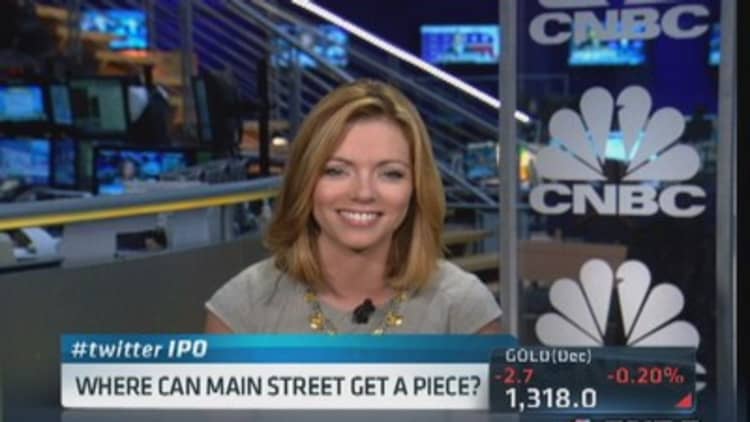The Twitter IPO may be getting closer, but its early investors still may have to wait awhile before cashing out.
Lead underwriter Goldman Sachs this week sent dossiers to employees and investors outlining the dates at which the parties can sell. The documents included strict language precluding insiders from monetizing their investments in the IPO, unless expressly permitted by Goldman Sachs, according to people familiar with the matter. As of right now, it's expected Goldman will take a hard line toward would-be sellers, these people say.
Employees, meanwhile, were said to be reminded in the documents of a standard, 180-day lockup period.
Investors were supposed to agree to those terms and send the documents back to Goldman Sachs by 8 p.m. Wednesday, after which the groundwork would be laid to submit a comprehensive, public S-1 filing. (A confidential S-1 was filed earlier this summer, which Twitter announced—fittingly—on Twitter.)
(Read more: 4 numbers to watch for in Twitter's SEC filing)

The move to restrict insider selling is yet another way Twitter's IPO attempts to differentiate itself from Facebook's disaster in May 2012. At the time, 57 percent of the shares Facebook was selling to the public came from insiders—meaning sophisticated investors who had already gotten in and made a buck were looking to dump the shares onto Main Street. Prohibiting insider selling is just one way Goldman Sachs was said to pitch itself as the lead underwriter for an "anti-Facebook" IPO, people have said.
With most large investors standing behind the policy, the outreach by Goldman and Twitter appears to have worked. Press-shy private equity firm Rizvi Traverse, which has quietly sopped up more than $1 billion in shares from Twitter employees, isn't selling anything in the deal, according to two people familiar with the matter. DST, the investment outfit led by Russian mogul Yuri Milner, is also said to be sitting tight on its $400 million stake. Other large holders of Twitter private stock were said not to be selling, too.
(Read more: Facebook and Twitter's growing competitors)
Goldman's position on the matter may change, especially in a scenario where demand for the deal far exceeds expectations. One potential scenario, a source said, could see Goldman allowing investors who want to sell shares bundle them into the deal's "greenshoe," an overallocation of shares that only gets sold in times of outsized demand. One thing's for sure: If Twitter's a get-rich scheme, it's going to take at least 180 days for those riches to materialize.
—By CNBC's Kayla Tausche. Follow her on Twitter: @KaylaTausche

